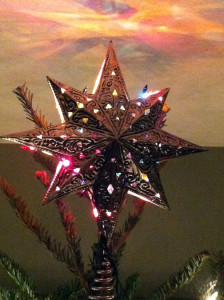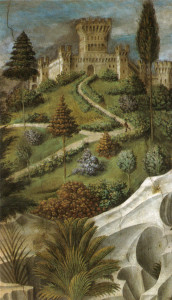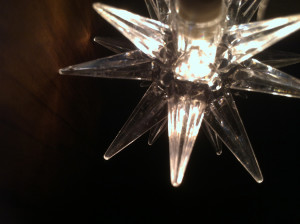TENTH DAY of CHRISTMAS
St. Titus’s and St. Gregory’s Day
If you were lucky enough to have time off from work for Christmas, it is probably over by now. Many of us, myself included, are back to work today, this Monday after New Year’s. The immersion into ordinary time begins again. Christmas, however, is not quite over. There are still two more days besides this one. To end it properly, you would do well to mark its close on Tuesday night with Twelfth Night and on Wednesday with Epiphany. For today, this Tenth Day of Christmas, we have one last contemplative day. It is the feast day of a number of saints in the church calendar: St. Titus and St. Gregory, and also St. Rigobert and St. Ramon.
There are no traditional customs for this day. So aside from returning to work, it seems to me a good day (or evening, in our case) to prepare for the festivities to come. For two years now on this day we’ve been sharing with you our recipe for Three Kings Cakes, which we make most years in these waning days of Christmas. Sharing it with you today gives you time to bake the cakes so they are ready for Twelfth Night or Epiphany. The recipe yields three cakes, cakes you will prepare in three loaf pans, so gathering three pans is a good place to begin. You will end up with one cake for each of the Magi, who have traditionally been called Caspar, Melchior, and Balthasar, though no one knows who they were really. As the story goes, it took the Magi all this time to travel through the desert, and seeing the child lying in the straw was their great epiphany. The cakes we make in their honor are distinctly not modern. Their flavors are flavors of the ancient world, flavors the Magi would have known well: honey and rose water. We happen to sell a wonderful rose water, made at the Sabbathday Lake Shaker Community in Maine. If you’re local and you need some to bake these cakes, let me know and together we’ll find a way to get you a bottle in time.
Come tomorrow night, the last players in our Yuletide tale, all of them gift bearers, will make their entry onto the stage: those three kings, and also la Befana, the good Italian witch who is so busy at her housework each year, just like most of the Italian women I have known in my life, and I have known so very many. Grandmothers, mothers, aunts, sisters, cousins, cummaras (cummari, to be proper), all of them busy at their work. And all of us, too: so busy, we don’t take time for what’s truly important. When la Befana realized she really did want to go with the Magi to see the child, it was too late. And still she wanders, searching for the child. Keep in mind we will not be remembered for our efficiency once we are gone. We will, however, be remembered for what kindness and happiness we have bestowed. These cakes proffer both.
*
THREE KINGS CAKES
makes three cakes
For the Batter
1 cup butter
generous 3/4 cup sugar
2 eggs
2 teaspoons vanilla
2 1/2 cups currants
3 cups applesauce
1/2 teaspoon salt
1 tablespoon baking soda
1 teaspoon cinnamon
1/2 teaspoon ground cloves
4 cups flour
Preheat oven to 300 degrees. Cream together the butter and the sugar, then add the eggs and vanilla. Beat smooth before adding the remaining ingredients. Grease 3 loaf pans (about 8″ x 4″ x 3″ or so) and divide the batter amongst the pans. Bake for one hour, or until a toothpick poked into the center of each cake comes out dry. Let the cakes cool in their pans on a rack.
For the Syrup
1/2 cup honey
1/2 cup sugar
1/2 cup water
1 cinnamon stick
6 whole cloves
2 tablespoons rose water
Once the cakes are baked, combine the syrup ingredients, except for the rose water, in a saucepan over medium heat. Once the sugar dissolves, add the rose water. Remove the cinnamon stick and the cloves and then pour the hot syrup over the cakes in their pans, divided equally amongst the three cakes. The syrup will soak into the cakes. Allow to cool completely before unmolding from the pans. Serving the three cakes on three platters makes for a nice presentation on Epiphany Day or on Twelfth Night.
Image: The star upon our Christmas tree. Seth & I discovered just last night a really lovely illuminated star high above a home near to Lake Avenue on our street, but alas, tonight when I went to photograph it, it was gone. Be that as it may, this star does the job nicely.


